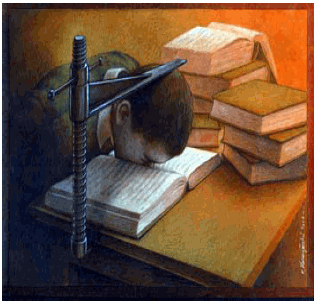Reflections on Allison Reynold's Talk on Job Skills for the Workplace
 I listened to STC Atlanta's recording of Allison Reynold's talk on job skills for the workplace and what universities should be teaching tech writers. Three ideas struck me during the presentation. They may not have been her main points (there was a lot of audience discussion), but they were what I walked away with.
I listened to STC Atlanta's recording of Allison Reynold's talk on job skills for the workplace and what universities should be teaching tech writers. Three ideas struck me during the presentation. They may not have been her main points (there was a lot of audience discussion), but they were what I walked away with.
1. Employers looking to hire candidates for the long-term primarly look for assets such as business skills and leadership qualities rather than tool knowledge.
2. In tech writing programs, students should learn tools on their own.
3. The question of whether academics are out of touch with the real world is unfounded.
Allison made her slides available here. Below are my reflections on these three ideas.
What skills do employers look for?
In this talk, Reynolds says employers see mastery of some tools as evidence for your ability to learn new tools. So if you know RoboHelp and Paint Shop Pro, but not Flare and Photoshop, the employer won't scratch off your name as someone unqualified because you don't have the right skill set. If you know some tools, you can easily learn new ones. It's the ability to learn that is more important than any particular knowledge you may already have.
In one of her questionnaires, a hiring manager wrote:
As a (past) hiring manager, tools' skills are not a priority. If a CV shows the candidate has used a variety of tools that is evidence of adaptability and learning skills.
If the actual tool that I use is not on the list but the candidate has used more than one tool (or more than MS-Word), then usually the candidate will be able to pick up my tool with little difficulty.
Should students be responsible for their own tool learning?
For the most part, yes, students should learn tools on their own. However, I think a couple of tools classes in college wouldn't hurt. I actually wished I'd double-majored in graphic design or computer science and English (rather than just English). At least some kind of surveys class on tools should be required.
Academics argue that tools change too quickly to be valuable for instruction, and that focusing on tools lowers the quality of education to the vocational level.
That may be partly true; however, tools are critical skills that tech writers need to get jobs. If you can't use a graphics program, don't understand styles in Word, have little idea how to create an online help file, and don't know what content management means, you'll be at an unfair disadvantage in the marketplace. You need some basic skills to get your foot in the door.
Still, the burden for learning tools should be on the student, simply due to the variety of tools and the need for students to be self-learners.
Are academics out of touch?
This seems to be a particularly controversial question. I'd say the answer is both yes and no. Last year after I attended several STC Summit sessions led by academics, I started growing a little weary of attending presentations by academics. For example, one session was supposed to explore how online mediums are changing the kind of information we can deliver to our audience.
The biggest point of the session was that online mediums allowed for a multitude of audiovisual content that, prior to the Internet, would have been impossible.
As a case in point, the presenter discussed the Ivory-billed woodpecker. Scientists weren't limited to a few still photos and journal-written descriptions to make their case for it. They could present a multitude of audio and visual files through the web medium.
That was the point of the entire session. I kept wondering if I missed something, or if the presenter was going to take it a step further, but it remained pretty much just that.
On the other hand, I did attend another presentation by an academic on the psychoanalytics of Web 2.0 that turned out to be informative and gripping. He had a good understanding of the topic and explored it from many different angles.
He also had his pulse on the audience's interests and followed them into a long discussion about whether blogging was potentially self-damaging. For 2o minutes people talked about the dangers of Web 2.0.
While some academics might be in touch with the topics and issues of the day, others aren't so much. In this talk by Allison Reynolds, I definitely think she is in touch with the issues and needs of today's marketplace.
The podcast has a great deal of discussion about these points. Some of it is hard to hear because capturing group discussions is difficult, but it's a thought-provoking podcast to listen to. Thanks STC Atlanta for recording it and making it available.
About Tom Johnson

I'm an API technical writer based in the Seattle area. On this blog, I write about topics related to technical writing and communication — such as software documentation, API documentation, AI, information architecture, content strategy, writing processes, plain language, tech comm careers, and more. Check out my API documentation course if you're looking for more info about documenting APIs. Or see my posts on AI and AI course section for more on the latest in AI and tech comm.
If you're a technical writer and want to keep on top of the latest trends in the tech comm, be sure to subscribe to email updates below. You can also learn more about me or contact me. Finally, note that the opinions I express on my blog are my own points of view, not that of my employer.
